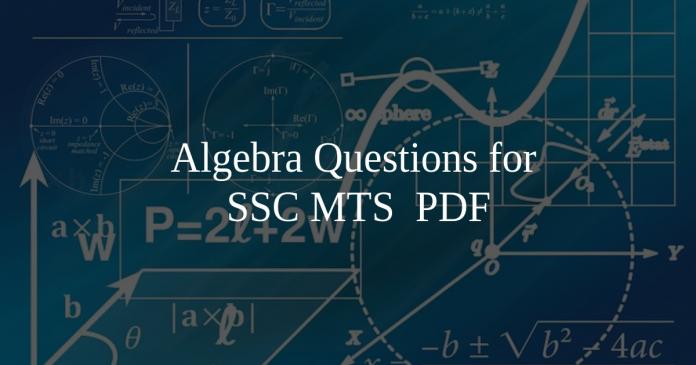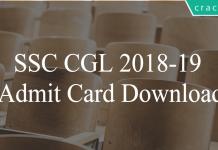Algebra Questions For SSC MTS PDF
SSC MTS Algebra Questions download PDF based on previous year question paper of SSC exams. 20 Very important Algebra Questions for SSC MTS Exam.
Download algebra questions for ssc mts pdf
Take a free mock test for SSC MTS
Download SSC MTS Previous Papers
1: The value of x for which the expressions 15 - 7x and 15x + 7 become equal is .
a) -4/11
b) -11/4
c) 11/4
d) 4/11
Question 2: If 5x - 3 ≥ 3 + x/2 and 4x - 2 ≤ 6 + x; then x can take which of the following values?
a) 1
b) 2
c) -1
d) -2
Question 3: Factorise $x^{2}$ + 3x -18
a) (x+18)(x-1)
b) (x+1)(x+18)
c) (x+6)(x-3)
d) (x+6)(x+3)
Question 4: If 5x + 4(1 – x) > 3x -4 > 5x/3 – x/3; then x can take which of the following values?
a) 2
b) 1
c) 3
d) -2
Question 5: If x + y = 10 and $x^2+ y^2$ = 68, then find xy
a) 21
b) 24
c) 25
d) 16
SSC MTS Study Material (FREE Tests)
Question 6: Coefficient of x in (x + 8)(6 – 3x) is
a) 18
b) 30
c) -18
d) -30
Question 7: What is the value of (91 + 92 + 93 + ……… +140)?
a) 5775
b) 11550
c) 17325
d) 23100
Question 8: If 2x – 3(x + 2) < 5 – 2x < – x + 2, then find the value of x.
a) 2
b) 0
c) 10
d) 12
Question 9: If $xy = -18$ and $x^{2} + y^{2} = 85$, then find the value of (x + y).
a) 8
b) 10
c) 9
d) 7
Question 10: If (8 + 10x) : (13x – 2) = 2, then the value of x is
a) -3/4
b) -4/3
c) 3/4
d) 4/3
Question 11: If 2x – 3(2x – 2) > x – 1 < 2 + 2x; then x can take which of the following values?
a) 2
b) -2
c) 4
d) -4
Question 12: If x – y = 6 and xy = 40, then find $x^2 + y^2$
a) 116
b) 80
c) 89
d) 146
Question 13: If 3x – 8(2 – x) = -19, then the value of x is
a) -3/11
b) -33/11
c) -3/5
d) -33/5
Question 14: If 3x + 2y = 7 and 4x – y = 24, then x – y = .
a) 9
b) 1
c) -9
d) -1
FREE SSC MATERIAL – 18000 FREE QUESTIONS
DOWNLOAD APP TO ACESSES DIRECTLY ON MOBILE
Question 15: On dividing $256a^2b^2c^2$ by $64a^2$, we get
a) $2c^2$
b) $2b^2$
c) 4
d) $4b^2c^2$
Answers & Solutions:
1) Answer (D)
Expressions : 15 - 7x and 15x + 7
=> $15 – 7x = 15x + 7$
=> $15x + 7x = 15 – 7$
=> $22x = 8$
=> $x = \frac{8}{22} = \frac{4}{11}$
=> Ans – (D)
2) Answer (B)
Expression 1 : 5x - 3 ≥ 3 + x/2
=> $5x-\frac{x}{2} \geq 3+3$
=> $\frac{9x}{2} \geq 6$
=> $x \geq \frac{4}{3}$ ————(i)
Expression 2 : 4x - 2 ≤ 6 + x
=> $4x-x \leq 6+2$
=> $3x \leq 8$
=> $x \leq \frac{8}{3}$ ————(ii)
Combining inequalities (i) and (ii), we get : $\frac{4}{3} \leq x \leq \frac{8}{3}$
The only value that $x$ can take among the given options = 2
=> Ans – (B)
3) Answer (C)
Expression : $x^2 + 3x – 18$
= $x^2 + 6x – 3x – 18$
= $x(x + 6) – 3(x + 6)$
= $(x + 6)(x – 3)$
=> Ans – (C)
4) Answer (C)
Expression 1 : $3x – 4$ > $\frac{5x}{3} – \frac{x}{3}$
=> $9x – 12$ > $4x$
=> $9x – 4x$ > $12$
=> $x$ > $\frac{12}{5}$ ———-(i)
Expression 2 : $5x + 4(1 – x)$ > $3x – 4$
=> $x + 4$ > $3x – 4$
=> $3x – x$ < $4 + 4$
=> $x$ < $4$ ——(ii)
Combining inequalities (i) and (ii), we get : $\frac{12}{5}$ < $x$ < $4$
Thus, only value that $x$ can take among the options = 3
=> Ans – (C)
5) Answer (D)
Given : $(x + y) = 10$ and $x^2 + y^2 = 68$
Using $(x + y)^2 = x^2 + y^2 + 2xy$
=> $(10)^2 = 68 + (2 \times xy)$
=> $2 xy = 100 – 68 = 32$
=> $xy = \frac{32}{2} = 16$
=> Ans – (D)
6) Answer (C)
A coefficient is a numerical or constant quantity placed before and multiplying the variable in an algebraic expression. Eg : In $ax^2$, coefficient is $a$
Expression : $(x + 8)(6 – 3x)$
= $6x – 3x^2 + 48 – 24x$
= $-3x^2 – 18x + 48$
$\therefore$ Coefficient of $x$ = -18
=> Ans – (C)
7) Answer (A)
Expression : (91 + 92 + 93 + ……… +140)
This is an arithmetic progression with first term, $a = 91$ , last term, $l = 140$ and common difference, $d = 1$
Let number of terms = $n$
Last term in an A.P. = $a + (n – 1)d = 140$
=> $91 + (n – 1)(1) = 140$
=> $n – 1 = 140 – 91 = 49$
=> $n = 49 + 1 = 50$
$\therefore$ Sum of A.P. = $\frac{n}{2} (a + l)$
= $\frac{50}{2} (91 + 140)$
= $25 \times 231 = 5775$
=> Ans – (A)
8) Answer (C)
Expression 1 : $5 – 2x < -x + 2$
=> $2x – x$ > $5 – 2$
=> $x$ > $3$ ———-(i)
Expression 2 : $2x – 3(x + 2) < 5 – 2x$
=> $-x – 6$ < $5 – 2x$
=> $2x – x$ < $5 + 6$
=> $x$ < $11$ ——(ii)
Combining inequalities (i) and (ii), we get : $3$ < $x$ < $11$
Thus, only value that $x$ can take among the options = 10
=> Ans – (C)
9) Answer (D)
Given : $(x^2 + y^2) = 85$ and $xy = -18$
Using $(x + y)^2 = x^2 + y^2 + 2xy$
=> $(x + y)^2 = 85 + (2 \times -18)$
=> $(x + y)^2 = 85 – 36 = 49$
=> $(x + y) = \sqrt{49} = 7$
=> Ans – (D)
10) Answer (C)
$\frac{8+10x}{13x-2}=2$
$\Rightarrow 8+10x = 26x – 4$
$\Rightarrow 12 = 16x$
$\Rightarrow x = 3/4$
so the answer is option C.
11) Answer (B)
Expression 1 : $x – 1 < 2 + 2x$
=> $2x – x$ > $-1 – 2$
=> $x$ > $-3$ ———-(i)
Expression 2 : $2x – 3(2x – 2)$ > $x – 1$
=> $-4x + 6$ > $x – 1$
=> $4x + x$ < $6 + 1$
=> $x$ < $\frac{7}{5}$ ——(ii)
Combining inequalities (i) and (ii), we get : $-3$ < $x$ < $\frac{7}{5}$
Thus, only value that $x$ can take among the options = -2
=> Ans – (B)
12) Answer (A)
Given : $(x – y) = 6$ and $xy = 40$
Using $(x – y)^2 = x^2 + y^2 – 2xy$
=> $(6)^2 = (x^2 + y^2) – (2 \times 40)$
=> $(x^2 + y^2) = 36 + 80 = 116$
=> Ans – (A)
13) Answer (A)
Expression : $3x – 8(2 – x) = -19$
=> $3x – 16 + 8x = -19$
=> $11x = 16 – 19 = -3$
=> $x = \frac{-3}{11}$
=> Ans – (A)
14) Answer (A)
Equation (i) : 3x + 2y = 7
Equation (ii) : 4x - y = 24
Multiplying by 2 on both sides, => $8x – 2y = 48$ ———–(iii)
Adding equation(i) and (iii),
=> $(3x + 8x) + (2y – 2y) = (7 + 48)$
=> $11x = 55$
=> $x = \frac{55}{11} = 5$
Substituting it in equation (ii), we get : $4(5) – y = 24$
=> $y = 20 – 24 = -4$
$\therefore (x – y) = 5 – (-4) = 5 + 4 = 9$
=> Ans – (A)
15) Answer (D)
Expression : $\frac{256a^2b^2c^2}{64a^2}$
= $\frac{256}{64} \times \frac{a^2b^2c^2}{a^2}$
= $4b^2c^2$
=> Ans – (D)





